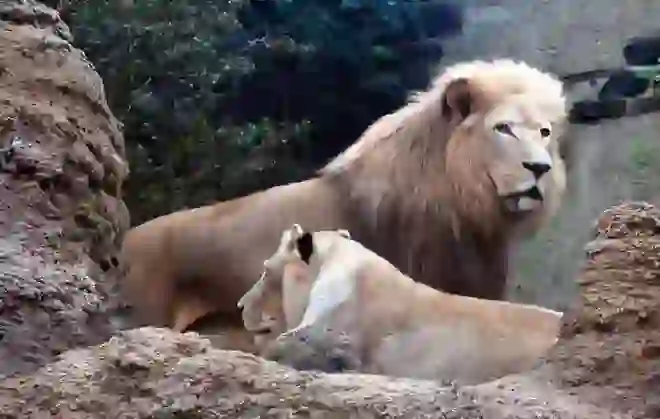
Transvaal Lion
Transvaal Lion
Transvaal Lion
In the vast savanna of Kruger National Park, South Africa, the Transvaal lion reigns with a kingly presence. Its golden mane and powerful roar embody the majesty of the 'King of Beasts'. Let's explore the ecology of the Transvaal lion and the challenges they face.
Transvaal Lion Basic Infomation
.webp?alt=media)
| Property | Value |
|---|---|
| Scientific Name | Panthera leo krugeri |
| Taxonomic Status | SUBSPECIES |
| Rank | SUBSPECIES |
| Vernacular Names | Southeast African lion |
| Kingdom | Animalia |
| Phylum | Chordata |
| Class | Mammalia |
| Order | Carnivora |
| Family | Felidae |
| Genus | Panthera |
| Habitats | Kruger National Park and surrounding areas in South Africa |
| Descriptions | The Transvaal lion is a subspecies of lion found in Kruger National Park and surrounding areas in South Africa. They are characterized by their large size and golden mane. |
| Conservation Status | Vulnerable |
.webp?alt=media)
Size
They are among the larger lions, measuring about 2.7 to 3.3 meters in length (including tail), with males weighing around 190 to 250 kilograms. Females are smaller than males, weighing around 120 to 180 kilograms.

Lifespan
They live for about 10 to 14 years in the wild.
_02.webp?alt=media)
Distribution
They are found in South Africa, Mozambique, Zimbabwe, and Swaziland. A large number of Transvaal lions inhabit Kruger National Park and surrounding areas in South Africa.
Transvaal Lion Q&A
.webp?alt=media)
What kind of lion is the Transvaal lion?
The Transvaal lion is a subspecies of lion found mainly in South Africa. They are known for their large size, muscular build, and golden manes.
Their manes cover not only their necks, but also their shoulders and bellies, resembling a golden cloak. They are also said to have longer legs and be faster runners than other lions. With their powerful physique and exceptional hunting skills, Transvaal lions reign supreme in the savanna ecosystem.

What do Transvaal lions eat?
Transvaal lions are carnivores and mainly prey on large herbivores such as wildebeest, zebra, buffalo, and giraffes. They hunt in groups, chasing their prey and bringing it down.
Female lions are the primary hunters. They are excellent hunters and work together to corner their prey. Male lions do not usually participate in the hunt, preferring to steal kills or defend them from other predators. Lions may also eat birds, reptiles, and fish. In the winter, when food is scarce, they may scavenge on carrion.
_02.webp?alt=media)
What kind of lives do they lead?
Transvaal lions live in groups called 'prides.' A pride typically consists of one male, several females, and their cubs.
Pride members cooperate with each other to hunt, raise their young, and defend their territory. The size of a pride can vary from a few individuals to several dozen. The leader of the pride is the strongest male lion. He must fight other male lions to protect his pride and earn the right to mate with the females.
.webp?alt=media)
[Quiz!] Why do male Transvaal lions have golden manes?
The color of the mane varies among individual Transvaal lions, but many have golden manes. This is thought to be an adaptation to the savanna environment where they live.
The savanna is a hot, sunny environment, and a golden mane helps reflect sunlight, preventing overheating.

[Quiz!] Do Transvaal lions attack humans?
Transvaal lions can attack humans, especially when food is scarce or their cubs are threatened.
However, they are generally afraid of humans and will not approach them. If you encounter a Transvaal lion, quietly leave the area. When entering their habitat, be cautious and do not leave food unattended or litter, as these actions can attract lions closer to human settlements.
_02.webp?alt=media)
[Quiz!] Are Transvaal lions endangered?
Transvaal lions are currently classified as Vulnerable. Their numbers are declining due to habitat loss, poaching, and human-wildlife conflict.
Their survival is particularly threatened outside of protected areas. To protect Transvaal lions, it is essential to conserve their savanna habitat, prevent poaching, and find ways for humans and lions to coexist. South Africa has established national parks and wildlife sanctuaries to protect Transvaal lions. Various other initiatives are also underway, such as community awareness programs and promoting ecotourism.

Would you like to become a part of the 'Animalbook.jp'?
Turn your knowledge into Q&A and share it with the world. ※Publication will be activated after purchase. Let's share information together!
Transvaal Lion Type of List
.webp?alt=media)
Efforts to Protect Transvaal Lions
- Establishment of national parks and wildlife sanctuaries
- Strengthening anti-poaching patrols
- Public awareness campaigns
- Promotion of ecotourism
Information
Congratulations! You are the first commenter!

Create Your Favorite List!
Transvaal Lion
Save the animals you love! Build your own list to quickly revisit your favorites later.

Would you like to leave a comment?
※Please note: This is for the purchase of rights to post comments within the article.
Find Your Favorites!
Our shop offers a unique and attractive selection of goods themed around various animals.
Transvaal Lion References
Transvaal Lion Introduction of media used
.webp?alt=media)
Palickap, CC BY-SA 4.0, via Wikimedia Commons

© Derek Ramsey / derekramsey.com
_02.webp?alt=media)
Andrew Shiva / Wikipedia

Help Enrich Our Animalbook.jp with Your Media!
We are constantly looking to expand and enrich our Animalbook.jp with amazing photos and videos of animals. If you have any media that you'd like to share, please contribute and help us showcase the beauty and diversity of the animal kingdom. Your submissions will be credited and featured in our encyclopedia, reaching a wide audience of animal lovers.


















